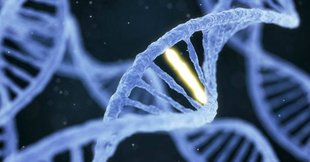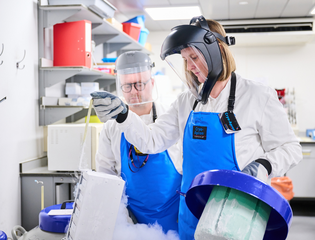Lynch syndrome: everything you need to know

Genetics
What is Lynch syndrome?
Lynch syndrome is an inherited condition that increases a person’s risk of several types of cancer, especially colorectal, endometrial, and ovarian cancers.
It’s caused by mutations in specific genes that are responsible for repairing DNA damage in cells. When these genes don’t work properly, errors in DNA replication occur, leading to genetic instability.
This instability increases the chance of cells becoming cancerous.
Lynch syndrome affects people of all ages and ethnicities, and understanding its causes, symptoms, and treatment options can help individuals manage their risk and make informed decisions about their health.
What genes are linked to Lynch syndrome?
It used to be known as “hereditary non-polyposis colorectal cancer (HNPCC)” and it is caused by a fault (aka mutation) affecting one of a number of genes.
There are four genes that have been linked to Lynch syndrome, called MLH1, MSH2, MSH6, and PMS2.
Mutations in another gene called EPCAM can cause Lynch syndrome by affecting MSH2, the gene next to it, but this is very rare.[1]
The MLH1, MSH2, MSH6 and PMS2 genes produce DNA mismatch repair proteins, and these stop cancer from developing by helping to repair any DNA damage that always happens when cells divide.
All cells have two copies of a gene, one from each parent.
So, a mutation, or spelling error, in one of these genes means that a cell only has one good copy. As a result, if that cell should suffer a mutation in the one good copy it can no longer repair mismatches and the DNA errors aren’t repaired.
The abnormal cells can continue to divide with these mistakes, which can then lead to uncontrolled cell growth. This is why your risk of cancer is increased.
[1] The Royal Marsden, Beginners Guide to Lynch syndrome, accessed Jan 2020 https://shared-d7-royalmarsden-public.s3-eu-west-1.amazonaws.com/files_trust/s3fs-public/Beginners_guide_to_Lynch_Syndrome.pdf
How does Lynch syndrome affect the body?
Lynch syndrome causes a higher risk of cancer, including ovarian cancer, due to the body’s inability to properly repair damaged DNA. This means that people with Lynch syndrome have a greater chance of developing cancers, particularly in the colon, uterus, stomach, and ovaries.
Lynch syndrome doesn’t cause immediate symptoms, but its effects become evident when abnormal cells grow unchecked, leading to cancer.
Symptoms of Lynch syndrome?
Lynch syndrome itself doesn’t have direct symptoms, but it increases the risk of developing cancer, which comes with its own warning signs.
Symptoms of Cancer
The symptoms will depend on which organ is affected.
Early signs of colorectal cancer include changes in bowel habits, blood in the stool, or unexplained weight loss. Endometrial cancer may present as unusual vaginal bleeding or pelvic pain. If you have Lynch syndrome, it's important to stay aware of any new symptoms and discuss them with your doctor.
The main symptoms of ovarian cancer are:
- Persistent stomach pain
- Persistent bloating
- Needing to wee more frequently or urgently
- Difficulty eating/feeling full more quickly
Other things to look out for include a change in bowel habits (going more often, or less frequently), extreme tiredness for no obvious reason, and unexplained weight loss.
How common is Lynch syndrome?
It is estimated that around 1 out of every 125 people have Lynch syndrome.[2]
However, it’s thought 95% of the carriers of these mutations are unaware that they are at risk, which is why family history and genetic testing are crucial for early detection of ovarian cancer.
Not all of the gene faults that come under the Lynch syndrome umbrella increase the risk of ovarian cancer, but for those that do, it is estimated that they are found in around 1 out of every 270 people.
[2] Chapter 14, Lynch syndrome, p.516: WHO Classification of Tumours Editorial Board. Digestive system tumours. Lyon (France): International Agency for Research on Cancer; 2019.
Lynch syndrome life expectancy
People with Lynch syndrome can live long, healthy lives if they manager their cancer risk. Early detection and regular screening can significantly reduce the chance of developing cancer.
Genetic faults linked to Lynch syndrome are not a guarantee that you will develop cancer, but it does increase the risk that you will be diagnosed with certain cancers in your lifetime.
The different gene faults also impact risk in different ways and for different cancers, so it’s important to speak to your genetic counsellor to fully understand your personal risks.
Causes of Lynch syndrome
Lynch syndrome is caused by inherited genetic mutations that affect how the body repairs damaged DNA.
Genetics
Mutations in specific genes, such as MLH1, MSH2, MSH6, PMS2, and EPCAM, are responsible for Lynch syndrome. These genes normally help repair DNA errors, but when they’re mutated, cells are more likely to develop into cancer.
How Lynch syndrome is inherited
We have two copies of each Lynch syndrome gene, one from each of our parents, but we only need to inherit one mutated copy to be affected.
This means if one of your parents has Lynch syndrome, it is a 50/50 chance whether you inherit it too.
You can inherit Lynch syndrome from your mother or your father. In rare cases, you may be the first person in your family to have Lynch syndrome because of a newly arisen mutation (“de novo”).
If you have Lynch syndrome, it is a 50/50 chance that each of your children will inherit the mutation, whether they are boys are girls.
Can Lynch syndrome skip a generation?
No, Lynch syndrome doesn’t skip generations. However, not everyone who inherits the mutation will develop cancer, which may make it seem like it skips a generation.
Diagnosing Lynch syndrome
If you have a personal diagnosis of colorectal or womb cancer, you are eligible to be tested for Lynch syndrome.
This is because NICE Diagnostics guidance recommends that everyone with colorectal or womb cancer, no matter their age, is offered tested of their tumour initially, followed by a blood testing for Lynch syndrome when necessary. Please speak to your cancer team to find out more.
You may be eligible if you have had a Lynch syndrome related cancer under the age of 50 or if you have had two or more Lynch syndrome-related cancers at any age. You should speak to your clinical team to find out more.
Otherwise, your eligibility will be based on your family history of cancer.
You should speak to your GP to discuss in detail whether you might be eligible for referral to your local genetics clinic. The referral criteria are complicated, but if any of the following apply you may want to look into this further:
- Any family members diagnosed with colorectal cancer or Lynch syndrome-related cancers (see the tables above) under the age of 50 and/or
- Three or more relatives with Lynch syndrome-related cancers (see the tables above) on the same side of the family
If these apply to you, you can speak to your GP about being referred for genetic counselling where you can talk about your risks, screening and prevention options. If you did go ahead with genetic testing, this takes place through a simple blood test.
Please see here for more information about cancer risk reduction and screening.
Increased cancer risk associated with Lynch syndrome
Lynch syndrome is not a guarantee that you will develop cancer, but it gives you an increased risk that you will be diagnosed with certain cancers in your lifetime.
The table below shows the estimated lifetime risk (up to age 75) across all Lynch syndrome gene faults. Note that the risks vary depending on which gene fault is inherited.
Source: The Royal Marsden NHS Foundation Trust, A Beginner’s Guide to Lynch syndrome, Accessed September 2024.
| Male | Female | |||
| Lifetime risk | General population | Lynch syndrome carrier | General population | Lynch syndrome carrier |
| Colorectal | 7% | up to 57% | 6% | up to 48% |
| Ovarian | - | - | 2% | up to 17% |
| Womb | - | - | 3% | up to 49% |
| Upper gastrointestinal | 5% | up to 22% | 4% | up to 13% |
| Ureter/kidney | 3% | up to 18% | 2% | up to 19% |
| Bladder | 2% | up to 13% | <1% | up to 8% |
| Brain | <1% | up to 8% | <1% | up to 3% |
| Prostate | 18% | up to 24% | - | - |
Living with Lynch syndrome
It is important to speak to a genetic counsellor to understand your risks in more detail as this will vary depending on your exact mutation.
What is genetic counselling?
Genetic counselling is the process of helping individuals and families understand the medical, psychological, social and reproductive implications of genetic and congenital conditions. Genetic counsellors are healthcare professionals with specialist training in the science of genetic disease, communication skills and counselling.
Alice Young, Genetic Counsellor at Guy's and St Thomas' Hospital, has written a useful blog on genetic counselling - who it's for, when it's needed, and what happens during a session. Download the blog here.
Be symptom aware
For details on the signs and symptoms of these cancers, see here:
If you need support, please contact brca@ovarian.org.uk or the support group Lynch Syndrome UK.
With thanks to Dr Ian M Frayling MA MB BChir PhD FRCPath Hon.FFPath(RCPI) FEBLM Consulting Genetic Pathologist to St Mark's Hospital, London & St Vincent's Hospital, Dublin. Honorary Senior Clinical Research Fellow, Inherited Tumour Syndromes Research Group. Member of Council & Honorary Treasurer, InSiGHT and UK Cancer Genetics Group Honorary Adviser to Lynch Syndrome UK and Lynch Syndrome Ireland.
FAQs
Does everyone with Lynch syndrome get cancer?
Not everyone with Lynch syndrome will develop cancer, but the risk is significantly higher compared to the general population. Regular screenings and proactive healthcare can help reduce this risk.
Is there a recommended diet if you have Lynch syndrome?
While no specific diet can prevent cancer in people with Lynch syndrome, a balanced diet rich in fruits, vegetables, and fiber, and low in processed foods, may help reduce cancer risk. Maintaining a healthy weight is also important.
Does Lynch syndrome cause polyps?
Yes, people with Lynch syndrome often develop polyps in the colon, but these polyps can turn cancerous more quickly than in people without Lynch syndrome. Regular colonoscopies are essential for monitoring and removing polyps early.


